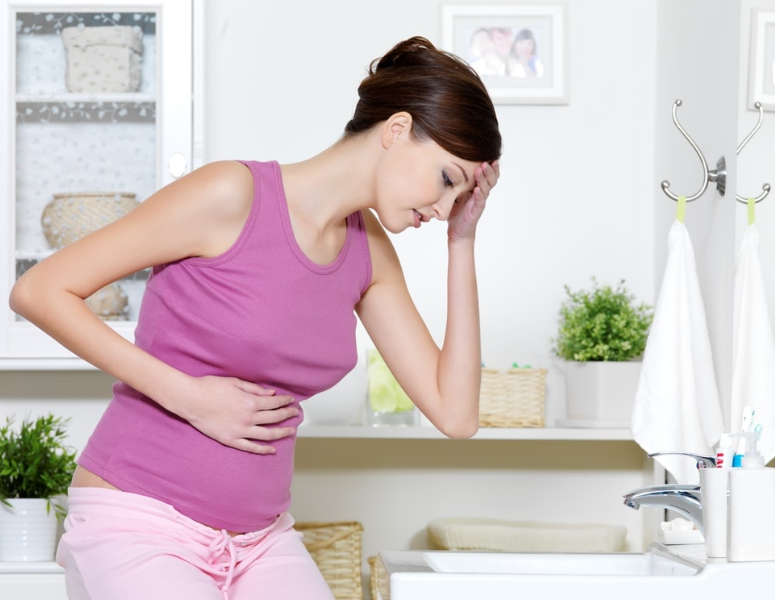Hormonal changes during pregnancy are often accompanied by unbearable nausea. This condition is part of the morning sickness that is common, especially in the first trimester. Pregnant women often feel nauseous just from eating rice. Is this normal, and is there a way to fix it?
Why do young pregnant women often feel nauseous after eating rice?
Nausea is usually felt by more than 70% of young pregnant women. Despite this, several factors make pregnant women nauseous, especially after eating rice.
-
Hormonal changes

Hormone levels that change during pregnancy make it easier for expectant mothers to feel uncomfortable about eating. In addition to increasing the hormone estrogen, pregnant women also produce the hormone human chorionic gonadotropin (HCG) from the placenta. The more HCG delivered, the more frequently and more severely you will complain of nausea.
Under certain conditions, hormonal changes can lead to hyperemesis gravidarum, a complication in the first trimester in the form of severe nausea and vomiting. Nausea and vomiting due to hyperemesis gravidarum can lead to weight loss in pregnant women of up to five percent. Pregnant women affected by it are usually even hospitalized.
-
Smell is more delicate
According to a study published in Chemical Senses (2013), two out of three pregnant women experience increased sensitivity to smells.
It makes women who are young and pregnant feel nauseous when they try to eat rice, even just smelling it. This sensitivity applies to rice and when pregnant women smell perfume, coffee, and spices. If this condition leads to insufficient nutritional intake, seek immediate medical attention from an obstetrician for a solution.
-
Stress during pregnancy
When you feel stressed, your body releases the hormone cortisol. An increase in the hormone cortisol in the body is associated with the production of stomach acid.
This condition makes pregnant women easily nauseous even when eating rice. Stress in pregnant women, if left alone, can cause high blood pressure, which is dangerous for the pregnancy.
-
Constipation
During pregnancy, the uterus grows until it suppresses or even blocks the digestive tract. This condition can cause food movement to slow, leading to constipation and nausea. In addition, an increase in the hormone progesterone also slows down the digestive process. Gastric emptying is also delayed. An affected gallbladder will lead to reactions such as nausea and vomiting, especially in the morning. Besides, sickness can also be caused by side effects of different medications or vitamins during pregnancy. Tell your doctor if constipation is caused by the medicines you take. Doctors can issue other prescriptions.
-
Urinary Tract Infection
Based on a book titled Urinary Tract Infections During Pregnancy (2022), pregnant women have a higher risk of developing UTIs in the first trimester. A UTI’s hallmarks are nausea, vomiting, and discomfort. Since these three are similar to first-trimester ailments, many pregnant women may not be aware of them. Abdominal pain and fever are late symptoms of a urinary tract infection. Urinary tract infections are often realized here.
How to deal with nausea eating rice during young pregnancy

No concrete way to prevent discomfort during young pregnancy, including nausea from eating rice. This pregnancy problem generally improves as the fetus ages, specifically after the gestational age is over 15 weeks. However, you can treat nausea with self-care at home. Here are some options.
- Eat smaller portions more often.
- Reduce drinking during a meal.
- Find alternatives to rice for pregnant women.
- Ensure comfortable air circulation to get fresh air.
- Enough rest. If you’re tired, try lying down.
- Smell ginger or lemon if you feel nauseous.
- Avoid intense flavors like onion, coffee, or durian.
- Eat a snack like chips or crackers before you get up.
- Eat carbohydrate-rich foods such as potatoes, whole wheat bread, and beans.
- Wear loose clothing that does not put pressure on your abdomen.
If the condition of a pregnant woman with nausea does not improve from eating rice or is accompanied by additional symptoms, you should see your obstetrician immediately for a solution.
- Dark urine or pregnant women can not urinate for more than eight hours.
- Continuous vomiting for 24 hours.
- High blood pressure.
- vomit blood.
- dehydration.
- Saliva production increases dramatically.
- Extreme weight loss.
Nausea when eating rice in pregnant women
- Eating sickness is part of morning sickness during pregnancy.
- Often occurs in the first trimester and improves with gestational age.
- Do not eat large portions. Take smaller portions, but more often.
Ten benefits of eating rice during pregnancy

Rice is one of the staple foods of Indonesian society. The nutrient content is just as important compared to other types of carbohydrates. Come check out the benefits of rice, specifically for pregnant women and their fetuses.
-
Source of good energy
Rice (Oryza sativa) is one of the oldest grains in the world, having been cultivated by humans for at least 5,000 years. It’s a staple food for more than half of the world’s population. About 90 percent of the world’s rice comes from Asia. Thousands of varieties differ in how they are processed and their color. Two of them are white rice and brown rice. Besides being prepared in rice, rice can also be used as a product in the form of flour, syrup, oil, bran, and milk. Rice contains many essential nutrients, including calories, carbohydrates, protein, and fat (although the amount is minimal). The following is the nutritional value contained in 100 grams of white rice:
- Calories 130
- Carbohydrates 28.7 grams
- Protein 2.36 grams
- 0.19 grams of fat
The high carbohydrate content in rice is a good energy source for the body. Eating rice gives you strength and energy during pregnancy. In addition to the above nutrients, rice is also high in fiber. However, brown rice’s amount of fiber is more elevated than white rice’s, which is about 1.6 grams per 100 grams.
-
Prevent constipation
Rice contains varying amounts of soluble fiber, known as resistant starch. This starch increases butyrate in the gut, which is beneficial for reducing inflammation, improving gut barrier function, and reducing the risk of colon cancer. The presence of resistant starch in rice facilitates the growth of beneficial bacteria in the stomach, which contributes to regular and smooth bowel movements during pregnancy. It also helps in better digestion of food.
-
Strengthens the bones
The presence of essential nutrients like vitamin D, thiamine, and riboflavin, as well as minerals like calcium, fiber, and iron, make rice a nutrient-dense food that helps strengthen bones and teeth.
-
Controls blood pressure
Rice helps regulate blood pressure. Its low sodium content balances and reduces the effects of sodium intake from other foods.
-
Prevents urogenital infections
Rice is a natural diuretic, meaning it increases the frequency of urination. It helps prevent urinogenital infections during pregnancy that could otherwise be detrimental to you and your fetus.
-
Improving the body’s immunity
Rice is rich in antioxidants that boost your immunity and help your body fight infection and disease. Of course, this is very needed during pregnancy.
-
Helps control blood sugar levels
Aside from white rice, eating brown rice while pregnant has its benefits. The presence of high levels of insoluble fiber and a low glycemic content makes brown rice the right food to help regulate sugar levels in the body. Brown rice, in particular, helps in relieving gestational diabetes, which is a common occurrence during pregnancy.
-
Helps in the brain and nervous system development
Brown rice is rich in neurotransmitter nutrients that improve a baby’s cognitive function and aid brain development. Brown rice is also a rich source of magnesium, which helps regulate nerves and muscles, keeping both relaxed.
-
Prevent insomnia
Rice, predominantly brown rice, contains melatonin, a sleep hormone that relaxes nerves and promotes sleep cycles, promoting better sleep quality. Of course, this helps mothers get enough rest breaks – some pregnant women experience sleep disturbances or sleep disorders.
-
Controls cholesterol
One of rice’s most excellent benefits is that it’s a cholesterol-free food. As can be seen from the explanation of the nutritional value of rice above, rice contains no fat – there is, but very little. Therefore, eating rice can balance other foods’ cholesterol levels and prevent mothers from having cholesterol-related problems.
